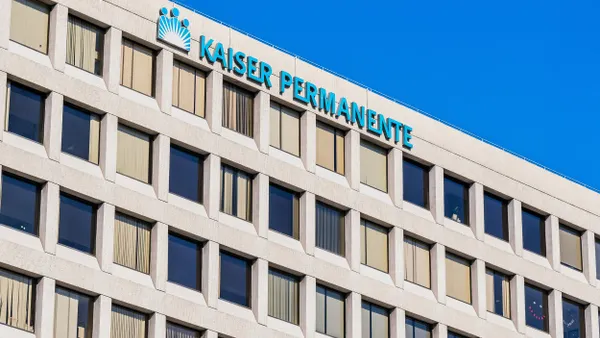Dive Brief:
- Ballad Health is suing UnitedHealth for allegedly gaming the Medicare Advantage program, damaging patients and hospitals — particularly those in rural areas.
- The lawsuit filed in Tennessee district court on Tuesday argues that UnitedHealth, which owns the largest private insurer in the U.S., "systematically abuse and manipulated" MA in order to profit, including through aggressive claim denials. UnitedHealth’s practices have lost Ballad more than $65 million over the last five years, the system said.
- It’s Ballad’s first lawsuit against an insurance company. Executives for the regional system said they felt forced to turn to the courts after years of unsuccessful attempts to ameliorate payment and patient care issues.
Dive Insight:
Ballad is a nonprofit system formed in 2018 through a merger of two legacy health systems, Mountain States Health Alliance and Wellmont Health System. Currently, Ballad operates 19 hospitals in Northeast Tennessee and Southwest Virginia, a traditionally underserved region with high rates of conditions like diabetes, heart disease and substance abuse.
As a result, Ballad’s payer mix is heavily skewed towards government programs. Almost three-fourths of its admitted patients are covered by Medicare or Medicaid, according to the system’s complaint. Of Ballad’s patients in Medicare, the lion’s share are covered by Medicare Advantage, in which the government pays private insurers a per-member, per-month fee for managing the care of Medicare seniors.
MA plans are popular, given they’re often cheaper for enrollees and offer more flexible benefits. But there’s a drawback: MA insurers are allowed to curtail access to providers and services in a way that traditional Medicare does not.
Allegations that UnitedHealth’s insurance arm UnitedHealthcare, the largest MA organization in the country, is abusing that power is at the core of Ballad’s lawsuit.
The insurer has systematically denied medical care, downcoded services and prevented patients from accessing post-acute care — all mechanisms that shield the insurer from paying out higher medical claims — with a significant downstream effect on Ballad’s finances, according to the system’s complaint.
The complaint shares examples of Ballad patients who have been affected. For example, one elderly woman who sought care at a Ballad emergency room for life-threatening exacerbation of her heart failure had her hospitalization denied by UnitedHealthcare, the suit says.
It also claims that UnitedHealth allegedly broke an agreement with Ballad to pay the system for MA patients who remained in its hospitals longer than anticipated. The stipulation was meant to stop UnitedHealth from denying approval for post-acute care, which leads to longer lengths of stay and unreimbursed hospital costs.
But despite multiple attempts from Ballad, UnitedHealth has yet to pay. As of the lawsuit’s filing, the insurer owes more than $7.1 million for the fees, according to the complaint.
“Taking legal action was our last resort,” Alan Levine, Ballad’s chairman and CEO, said in a press release on the suit. “But we had to take action because we believe UnitedHealth’s behaviors are so harmful to patients, doctors and community hospitals.”
UnitedHealth did not respond to a request for comment. But the company is facing mounting scrutiny over the practices that Ballad outlined, including in the courts, from antitrust regulators and on Capitol Hill.
Following a class-action lawsuit against UnitedHealth over allegations that the company used an algorithm to restrict post-acute care for MA patients, a Senate subcommittee report in 2024 found that the company denied the services at a higher rate than other MA payers.
UnitedHealth has broadly denied accusations that it is gaming MA in order to profit. Still, the company has pledged to do better, including forming a new public responsibility board committee this summer in a bid to improve corporate governance
Ballad said that it does not plan to renew its MA contract with UnitedHealth when it expires in 2027.
Hospitals nationwide, especially in rural areas, have been reconsidering arrangements with MA payers, citing delayed and denied care, administrative challenges and low payment rates.















